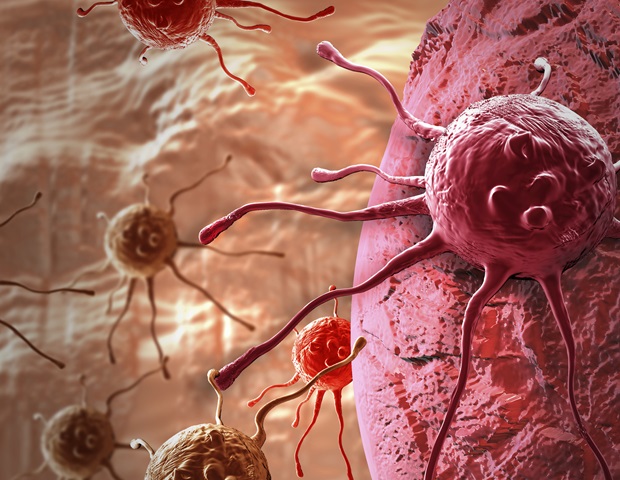Researchers at UAB and Vall d’Hebron identified the mechanism by which inhibitors of the protein kinase ERK5 interfere with the reproduction of cancer cells and cause their death. The results obtained with human cancer cell lines show that ERK5 inhibition activates cytotoxic autophagy, a process that causes cancer cell death without affecting healthy cells. A combination of ERK5 inhibitors and chemotherapy could improve cancer treatment.
The synthesis of cellular proteins takes place at the endoplasmic reticulum. In response to various factors such as lack of nutrients or oxygen, the endoplasmic reticulum becomes stressed, a process that can endanger the survival of cells. To deal with this, a process called UPR (Unfolded Protein Response) is started to restore protein production and cellular normality.
Among other things, UPR initiates autophagy, a biological process that enables cells to break down and recycle defective components. However, when the stress is extreme or prolonged, UPR is insufficient to restore protein production and UPR results in cytotoxic autophagy that activates apoptosis (cellular suicide).
UPR occurs in all body cells, but is of particular importance in tumor cells that have a high level of stress on the endoplasmic reticulum. UPR and autophagy allow tumor cells to better adapt to their environment and bypass the immune system. As a result, tumor cells are very sensitive to reaching levels of autophagy that are toxic to the cell. Therefore, autophagy modulation is a new therapeutic strategy for the treatment of cancer: drugs that induce high levels of autophagy can cause the collapse of tumor cells and the activation of the apoptotic cell death program.
The protein MAP kinase ERK5 controls the proliferation and survival of tumor cells and is a new therapeutic target for the treatment of cancer. ERK5 inhibitors have been shown to be effective in various cell and tumor models, both as monotherapy and in combination with chemotherapy. However, the mechanism by which these inhibitors induce tumor cell death was unknown.
A research team from Vall d’Hebron Research (VHIR) and the Universitat Autònoma de Barcelona (UAB) led by José Miguel Lizcano – associated with both institutions – has uncovered the mechanism by which ERK5 inhibitors lead to cancer cell death.
Using human tumor cell cultures from pancreatic, endometrial and cervical cancer, the researchers found that ERK5 regulates tumor autophagy. ERK5 inhibitors activate endoplasmic reticulum stress and UPR (which is already elevated in tumor cells) to levels that exceed their protective effect, and activate a toxic form of autophagy that ultimately leads to apoptotic death of tumor cells (a process known as cytotoxic Called autophagy).
ERK5 inhibitors sensitize tumor cells to chemotherapy, for which our research opens a very promising line for improving chemotherapy and for more effective strategies to fight cancer. “
José Miguel Lizcano, Autonomous University of Barcelona
Source:
Autonomous University of Barcelona
Journal reference:
Gámez-García, A., et al. (2021) ERK5 inhibition induces autophagy-mediated cancer cell death through activation of ER stress. Limits of cell and developmental biology. doi.org/10.3389/fcell.2021.742049.

